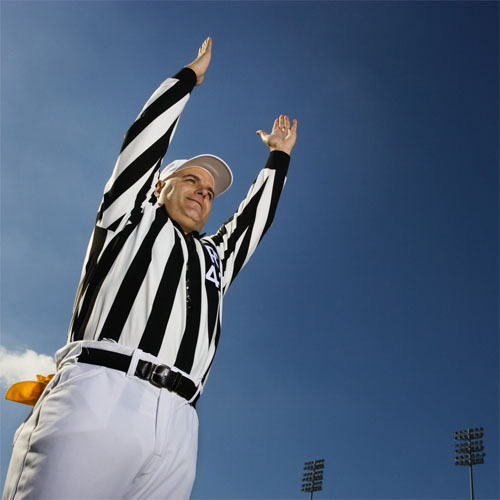
Zebra
Somewhere in, NJ
Male, 62
I've officiated football for over 30 years, now in my 26th on the college level. I've worked NCAA playoffs at the Division II and III level. In addition, I've coached at the scholastic level and have been an educator for over 35 years. I have no interest whatsoever in being an NFL official! Ever!
I believe all levels of football rules are pretty much in agreement on this. The NCAA rule book states: "Forward progress is a term indicating the end of advancement by the ball carrier or airborne pass receiver of either team and applies to the position of the ball when it becomes dead by rule."
The ball was held out and then the whistle blew. The ball was at a certain position - where Elliott had held it out - and that was where it was determined to have been when the runner's progress ended. It isn't much different from a ball carrier extending the ball over the goal line and then being pushed back; touchdown. Position of the ball.
Can someone help me? I'm guessing you're a college coach since low blocks are prohibited in high school. The rules have changed a number of times over the last several years and each time they do, there's a new "wrinkle"....or crease.
Can't possibly do it justice or be complete here, but blocks need to be in the "10 to 2" (o'clock) range as viewed by the blocker. But this year it was interpreted that the initial contact has to be from that direction. In other words, even if the hit is in the 10-2 area, the "attack" by the blocker has to be within that arc when initiated. Clear? Yeah, me neither. With wide receivers, they must - since they are initially outside the tackle box - either block above the waist or attack the 10-2 zone and initiate the attack from that direction. It's challenging to explain without visuals. That may be as good as I can get it - sorry.
Sometimes you folks ask a question that makes me think. This one, though, is too easy. As with any time in the game, when one team fumbles and the other recovers, it belongs to the recovering team. Here, it's 1st and 10 for A.
Probably because no one saw it.
CPR Trainer
 Is it possible to perform CPR on animals?
Is it possible to perform CPR on animals?
Claims Adjuster
Firefighter
 How can you tell if a fire was arson?
How can you tell if a fire was arson?
Depends what you're watching. In high school, the play us dead and defense offsides us enforced. In NCAA and NFL the defender can get back before the snap. There are times when even when the player isn't threatening the QB the play is stopped. Rule of thumb: if the defender is past the shoulder of an offensive player, they'll blow it dead.
You're asking questions of philosophy, something that isn't in the rule book. First, it depends who is calling the timeout, offense or defense. The defense often waits to the last second to call it in order to "ice" the kicker. But if the snap is in the process of going off, it is possible for the timeout to not be granted. You ask about the whistle blowing "very slightly" after the snap; that probably means it was asked for prior to the snap. When you see the snap go and the kick made as whistles are being blown, the timeout was granted prior to the snap - the kick will not count. Usually, for the offense the timeout is granted.
I have no idea what that means. Sorry, can't help.
-OR-
 Login with Facebook
Login with Facebook (max 20 characters - letters, numbers, and underscores only. Note that your username is private, and you have the option to choose an alias when asking questions or hosting a Q&A.)
(A valid e-mail address is required. Your e-mail will not be shared with anyone.)
(min 5 characters)
By checking this box, you acknowledge that you have read and agree to Jobstr.com’s Terms and Privacy Policy.
-OR-
 Register with Facebook
Register with Facebook(Don't worry: you'll be able to choose an alias when asking questions or hosting a Q&A.)